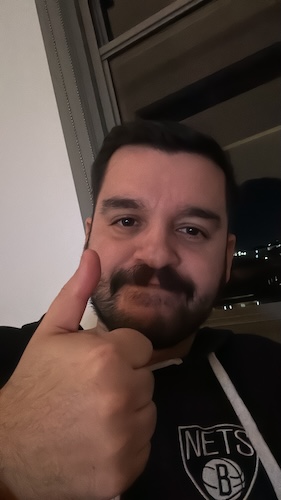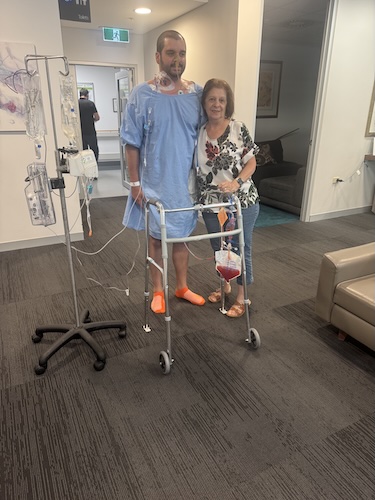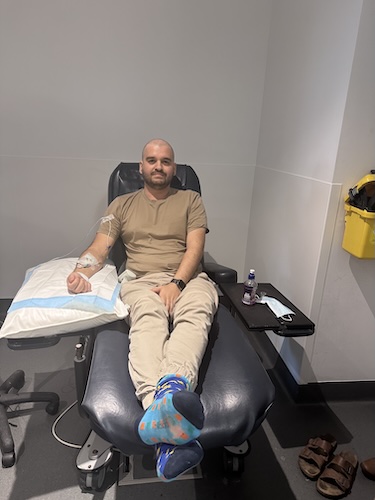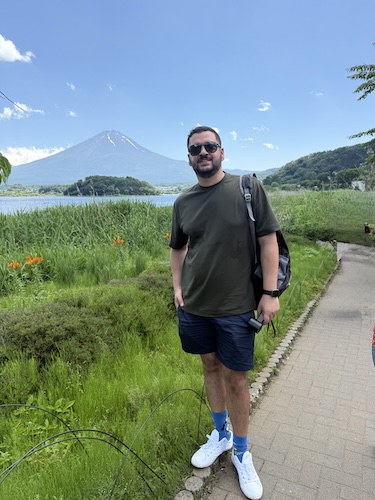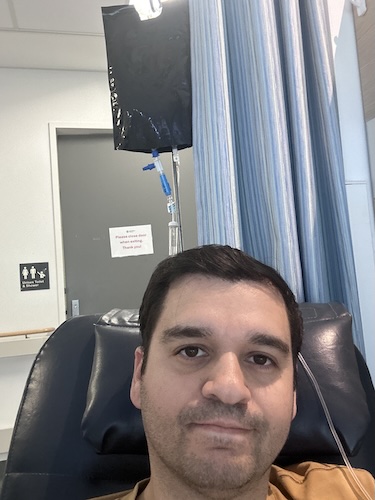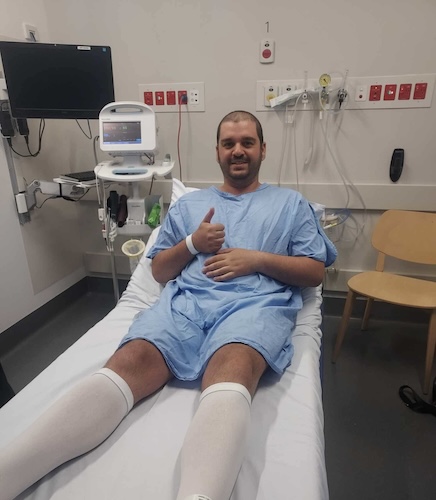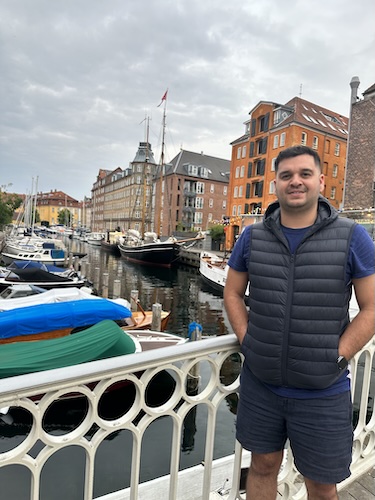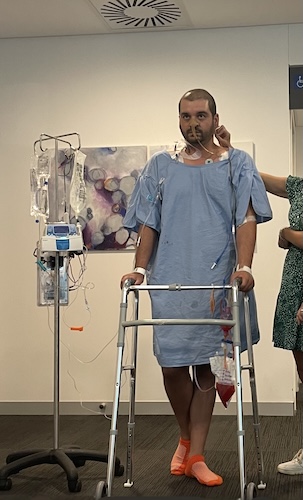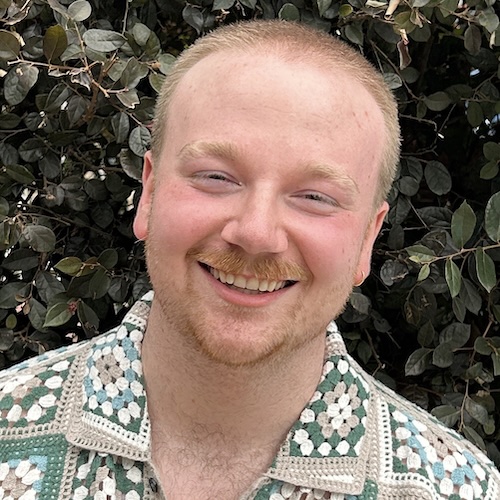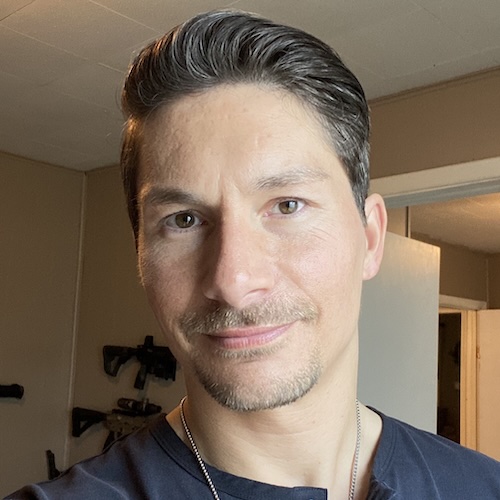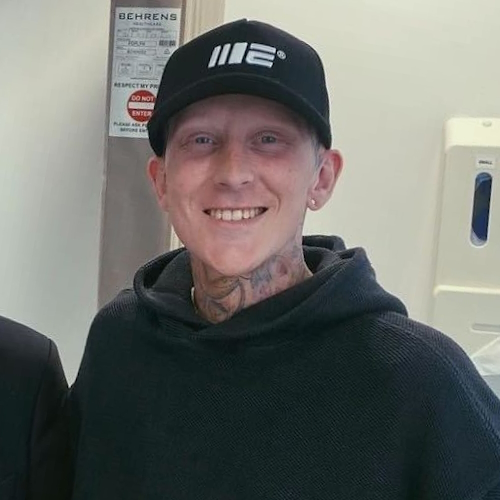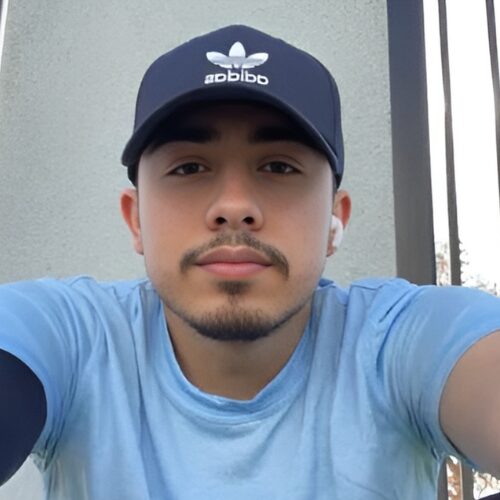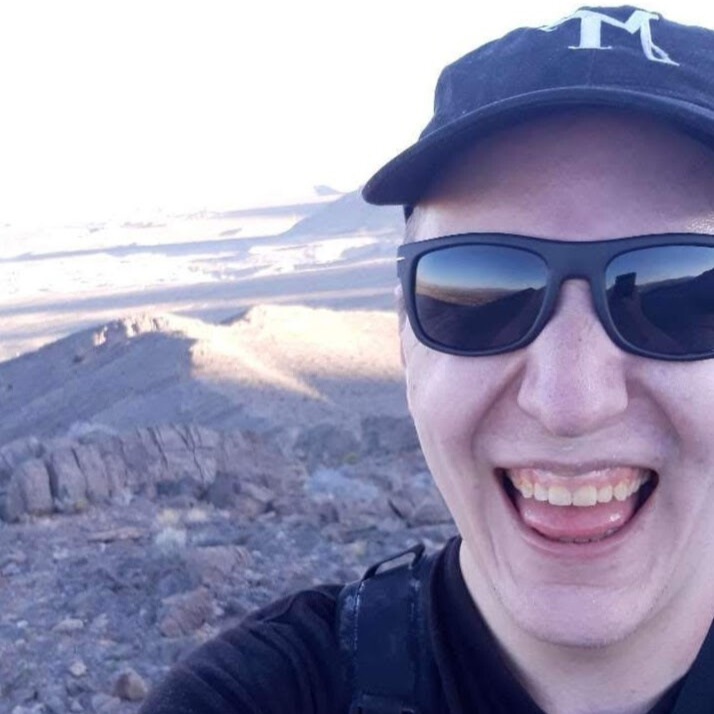“Enjoy Every Sunset”: Matt’s Stage 3 Testicular Cancer (Embryonal Carcinoma) Story
Matt shares his experience with stage 3 testicular cancer. He began to suspect that something was off when he started experiencing nagging lower back pain that he blamed on his mattress. For six months, he brushed off dizziness, fatigue, night sweats, and heart issues, never imagining it could be cancer. Only when he woke up one morning, unable to feel his left leg, did he finally get scans.
Interviewed by: Carly Knowlton
Edited by: Chris Sanchez
At first, Matt’s doctors thought he had a sarcoma. They found a tumor the size of a football, which left him shocked and terrified about losing the ability to walk. But weeks afterward, he received the surprising news that it was actually testicular cancer, specifically an embryonal carcinoma. (Editor’s Note: Embryonal carcinoma is a rare, aggressive form of testicular cancer in which germ cells, which would normally become mature sperm cells, instead form a malignant tumor inside a testicle.)
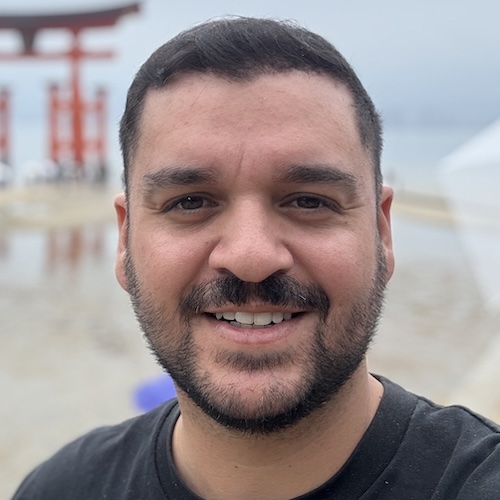
This diagnosis gave Matt hope because it meant that he could have chemotherapy. He started four intense cycles of chemo and struggled with the side effects, which included exhaustion, ringing in his ears, numbness in his extremities, and a constant fire-like heat in his face. The physical toll was heavy, but the mental weight of isolation and fear was just as real.
The treatment worked, shrinking Matt’s tumor to the dimensions of a mango. He later underwent major surgery. Recovery was grueling, involving days lying in the ICU filled with tubes, pain, and the emotional rock bottom of feeling trapped in his own body. But hearing that no active cancer remained was heartening. Slowly, he began walking again, regaining some normalcy and learning to trust his body.
Life after testicular cancer brought both reflection and purpose. Matt became “One Tough Nut Matt” on TikTok, sharing his story to raise awareness and offer the support he himself had once needed. He encourages men to check their testicles, listen to their bodies, and not ignore symptoms. He now savors small wins like watching sunsets, walking on the beach, and connecting with others.
Matt’s story is an authentic reminder that paying attention to your health — and talking about it — can save lives. Watch his video and read through his transcript to find out more about:
- How he went from thinking he had a bad mattress to discovering a football-sized tumor in his body
- What led Matt to prepare for a life-changing surgery that he thought he might not survive
- How he became the “1% of the 1%” and found hope in the most unexpected diagnosis
- How chemo pushed Matt to the edge, but how sharing his journey online gave him strength
- Matt’s mantra, “Enjoy Every Sunset,” and how it was born from the days he thought he’d never walk again
- Name: Matt B.
- Age at Diagnosis:
- 34
- Diagnosis:
- Testicular Cancer (Embryonal Carcinoma)
- Staging:
- Stage 3
- Symptoms:
- Severe lower back pain
- Loss of sensation in left leg
- Dizziness
- Fatigue
- Night sweats
- Heart complications
- Treatments:
- Surgeries: retroperitoneal lymph node dissection (RPLND), orchiectomy, liver resection, hernia repair surgery
- Chemotherapy
This interview has been edited for clarity and length. This is not medical advice. Please consult with your healthcare provider to make informed treatment decisions.
The views and opinions expressed in this interview do not necessarily reflect those of The Patient Story.
- Hi, I'm Matt
- When I first noticed something was “off”
- The moment everything changed
- I was originally misdiagnosed
- When I found out the correct diagnosis
- My treatment plan
- The side effects I experienced
- What recovery after surgery looked like
- How surgery impacted my life
- How I managed being diagnosed with cancer so young
- How I spread awareness
- How I look at life now
- How often I’m monitored
- What survivorship looks like to me
- What I want others to know
Hi, I’m Matt
I’m from Australia. I was diagnosed with testicular cancer on the 4th of July, 2024.
I’ve always enjoyed getting outdoors, living in Australia. We all live by the beach, right? Everyone grew up along the coast of Australia. Spending a lot of time at the beach, getting out with my mountain bike, was what I loved doing.
I’m funny, often ballsy. I’m always the one going rogue and creating a bit of excitement. I like to consider myself the life of the party, right? I bring a lot of laughter to people’s faces.
When I first noticed something was “off”
I went for a period of about six months, during which I had some really crazy lower back pain.
At first, I didn’t think much of it and kind of ignored it. Then it got worse to the point where I was having trouble sleeping. I was adamant that the mattress I was sleeping on was causing my back pain. So I bought multiple new mattresses, but it only got worse and worse. And this all happened over six months.
I went and saw my chiropractor, and he had some concerns and said, “Matt, if you wake up and you feel like you lose any feeling in your legs, you need to go get these scans done.” A couple of days later, sure enough, I woke up and I couldn’t feel my left leg anymore. And that’s what triggered me to finally get a scan.
I had dizziness, fatigue, night sweats, and lots of heart issues. I was put on a high blood pressure medication. I was put on heart rhythm medication for issues that my watch was telling me I was having with my heart. I kind of never really pieced those symptoms together as being something serious. It was only after the fact that I was like, “Well, hold on a minute.” I never had these symptoms before six months prior. So all those things were my body telling me that something was wrong, but I just never listened to the signs.
The moment everything changed
The radiologist came out, and I remember him asking me, “How long have you had back pain?” And I said, “Look, six months, kind of laughed it off.” And his words were, and I’ll never forget them, because it was like he had seen a ghost. “I think we’ve found the reason why you’re in so much pain. I’m going to call your doctor and see if he could arrange a few more tests.”
So I remember lying on that table, waiting for him to come out; it felt like a lifetime. And in that moment, I remember everything flashing in front of my eyes and ultimately him coming out and doing another CT scan, but with contrast this time. And it wasn’t until a few hours later that I’d get a call from my doctor to tell me that they had found something.
I was originally misdiagnosed
She said to me, “Look, Matt, they found a sarcoma.” And I went, “Okay. What’s that? Like, what do I do for that?” She said, “Look, it’s not that big. It’s about the size of a pencil, but it’s really long.” And I said, “What do you mean? What are we talking about here?” And she said, “It’s a muscle cancer.”
There are only a few specialized clinics in Australia that deal with sarcomas. So I was seen by a surgeon the very next day after being diagnosed. He said, “Look, you’ve got this tumor growing in your psoas muscle,” and I said, “At least it’s not very big.” He said to me, “Oh no, Matt, it’s very big.”
They’d actually made a typo on my original report. It wasn’t the size of a pencil. It was the size of a football. They’d confused a few of the measurements. So he said, “It’s really serious. Sarcomas are really serious.” And I said, “Okay, so if I have cancer, we’re talking about chemo, right?” And he said to me, “Chemo is off the table. It’s not something we can do for the type of cancer you have. We think you have a really aggressive, fast-growing muscle cancer, which is a liposarcoma. And the only treatment that we can do for you is to rush you into surgery and hopefully cut it all out.” He added, “Your tumor is growing along your spine on the main artery that supplies the blood to your legs. It’s growing against your kidney. It’s growing into your femoral nerve.”
At that point, I didn’t even know what a femoral nerve was, but I now know that it’s the nerve that supplies blood to your thigh down to your knee. And it allows you to squat, allows you to run, allows you to bend your knee. And I said, “What does that mean? Am I going to be able to walk after this surgery? He said, “You will be able to walk, but you’ll just have to learn to rewalk in a new way because you’ll have no control over that left leg.”
And in that moment, it all hit me. I went silent. I couldn’t talk anymore because for me, it was a massive deal to not be able to walk properly ever again.
When I found out the correct diagnosis
On that drive home, I received a call from my surgeon. And I thought, “What is going on? Why would the surgeon be calling me? I literally just saw him.”
He was calling to tell me that the biopsy results had come back, and I didn’t have a sarcoma. I actually had testicular cancer, and I had what was known as an embryonic carcinoma. A really rare type of testicular cancer, but it was testicular cancer, and he couldn’t be happier.
I was so confused. I’m like, “Why are you so happy? Is this a good thing?” He said, “This is an amazing thing. Your survival rates have just shot through the roof. The surgery is off. We’re going to send you straight away to start chemo. This is the best-case scenario. You already had the rarest type of cancer. You are now the 1% of the 1%. Take this as a miracle. This is your Hail Mary. You’ve got a chance.”
I was literally in disbelief. I did not see it coming. I had psyched myself up that I was going into this major surgery. I was going to walk through those doors at 5 am for a nearly 12-hour procedure, and I didn’t know if I was going to walk out of it again.
So I was in shock. Hey, how have I just gone through the last three weeks preparing for the worst, and now I’ve just had this miracle happen to me that I have testicular cancer? And it’s something I should be excited about. It was just like a whole massive mind spin for me.
I wanted to be excited, but I also just realized that I just found out that I had testicular cancer. How many people celebrate when they get told they have testicular cancer? I was now one of them.
My treatment plan
I basically got sent in to see an oncologist straight away, a specialist in testicular cancer. They found a very small lump, smaller than a pin, on my left testicle. And from there, they worked out that I had an embryonic carcinoma. Only around 20 to 40 people get it each year here in Australia. So it is really rare. It was considered a very aggressive cancer.
So they needed to go hard, and because of the size of my tumor, having surgery straight up wasn’t an option. It was, as I said, growing faster every day and bigger than a football. It was in my retroperineal. So it meant that it was really hard to get to. So they needed to shrink it. And the plan was to try to shrink it to get me ready for a pretty major surgery, but hopefully with better outcomes, where I could still walk properly.
So we did four cycles of chemo.
The side effects I experienced
The chemo I took is notorious for being rough. Those who have gone through it can attest to that.
For me, straight off the bat, in the first week or two, I started losing my hearing. I had ringing in my ears. I lost the feeling in my hands and feet. My face always felt like it was on fire. I had watched too many movies, and I had assumed that when you went through chemo, you would lose a lot of weight because you’d always be sick all the time, but the opposite was true for me because of the steroids they put you on to help with some of those symptoms. I couldn’t stop eating. I was eating five or six meals at a time. I’ve never been that hungry in my life. I just lost 20 kilos before I was diagnosed. I put on 10 kilos in eight weeks during chemo. But the biggest side effects for me were definitely the loss of feeling in my hands and feet, and the overall toll that chemo takes on your body.
I went through a trial for my chemotherapy. So, although this kind of chemo has been around for a while and is the mainstay for testicular cancer, they wanted to see if they could give it to me faster. So instead of having the break weeks, I just went back-to-back in these chemo cycles. So by cycle three, I was an absolute wreck. I couldn’t stand. I was so fatigued and exhausted. I couldn’t even talk. I went through periods of well over two months where I couldn’t put a sentence together. And everyone who knows me knows that I’m a talker.
We managed to shrink the tumor from being football-sized to the size of a mango. They wanted to do a retroperineal lymph node dissection or an RPLND, and we went in for one.
Although they had to take my psoas muscle, they were able to save the nerves, the femoral nerves. So I’m still able to walk normally, which is fantastic. While they were in there, they also found some tumors on my liver. So they did a liver resection. And they also found a hernia in my groin from the tumor. So they went in and fixed up the hernia as well. So that was a nice surprise waking up to that.
What recovery after surgery looked like
I woke up in the ICU after the surgery. I was cut open from my ribs all the way down to my groin. I obviously lost my abs. I had too many staples to count, well over 100, and I realized in that moment that this was going to be a tough few weeks recovering.
I had tubes coming out of everywhere. I had tubes down my nose, down my throat, in the side of my throat, in my stomach, in every arm. I had catheters, cannulas, everything. It was just machines everywhere. I had been prepared for some tubes. I knew I was going to get a tube in my throat and in my arm. I was told that I might need some sort of tube to drain my stomach, but no, nothing had prepared me for what I was going to wake up to. It was overwhelming. That was when reality set in, and I was unable to move because I had no core strength anymore. I couldn’t breathe.
And I was just constantly hearing machines beeping, and I was just going, “What is going on? Why is everything beeping?” The doctors said, “You’ve got to breathe, Matt, keep breathing.” It’s laughable now, but at that moment, I was just struggling.
And so this is the thing they don’t really talk about much. When you go on bleomycin, it causes a lot of damage to your lungs. But something they don’t tell you about is that when you have surgeries and so forth after it, you can’t be given a lot of oxygen because it can cause a really dangerous side effect. So my oxygen levels were dropping really low, but they weren’t able to give me much oxygen to bring them back up. So it was a perfect storm.
So I ended up spending three or four days in the ICU. I was not recovering well. My stomach was not draining well, so it was collecting a lot of bile, and it constantly needed to be pumped. I was also draining a lot of fluid from the incisions. Mentally, I was at rock bottom. I really struggled with having tubes down my throat. I knew I was going to have a tube, but I wasn’t prepared for how big it would be. And it really made me spiral, and it was probably the lowest part of my treatment. And that was where I hit rock bottom and could no longer mentally cope with what was going on. So I was heavily sedated to get me through the next couple of days. I was then relocated to a ward. And I spent well over two weeks in the hospital recovering.
Ultimately, we got a Christmas miracle, and on Christmas Eve, I was discharged after spending the night before watching the classic Christmas movies and crying myself to sleep because I was sitting in the hospital and I couldn’t move. I was discharged and sent home, and was able to spend Christmas with the family. But the next day I found myself back in the emergency. So at that point, my stomach had slowly started to restart, but I got a little bit ambitious. I’d gone from chicken broth in the hospital, so clear liquids, to trying to have a sandwich. And the sandwich was just too much, and my stomach went back into paralysis. So I couldn’t stop being sick. And at this point, I still had a thousand staples. So I risked bursting my stomach.
I was sent to the ED, the emergency department here, while I frantically tried to contact my surgeon to work out what was going on. He ultimately called them back and said, “Look, Matt’s going to be all right. There are no blockages. They did some scans. We don’t need to put the tube back in.” And they actually said you can take out the staples.
The best news that I got was that they got the pathology results back from the tumors. I sat down with the surgeon a week later. And I was told that there was no active cancer found in any of the tumors they took out, which was the best-case scenario.
I was in shock because I’d been given so much bad news over the seven or so months before it that I became so immune to positive news. I just didn’t think that was something I would get again. I just thought nothing would ever improve in my situation. Chemo really did a number on me. And although I fought every day and took it a day at a time, it wore me down. So by the time I had the surgery, I just wanted it done. I wanted to just move on. But I also felt like I was never going to be allowed to move on. So hearing that news was absolutely, absolutely amazing, to be told that there was no active cancer, and I didn’t have to go through another cycle of chemo.
How surgery impacted my life
I’d been off work for seven, seven or eight months. I’d regressed in the sense that I didn’t go out. I was so scared of getting sick. I was so paranoid that I was going to get unwell and end up back in the hospital that I self-isolated in many more ways than one.
I was lucky to be surrounded by so many supportive family members, friends, and work colleagues who were all backing me up. So I never once felt alone. I felt like no one really understood my situation, but I never felt alone, and I had a group of friends that would come around and really back me up when I was at my lowest. They were there to cheer me up, take me out, and show me that there was life after cancer, and that really got me through those tough days.
Things have been limited — even now, I’m still slow on my feet, although I’m able to walk normally, I did lose a muscle in my leg after all. So my body has to relearn how to do some things. It’s an adjustment.
I’m hoping to get back into the gym and get back to the beach this summer and get back to a bit of normality and socializing, doing things with my family.
How I managed being diagnosed with cancer so young
It was a shock. I’d never had a health scare in my life. I’d never been through anything significant like this before. And it really caught me off guard. I don’t think I was mentally prepared for the storm that I was entering. As every young guy does, you think you’re invincible. And that’s how I lived my life. I’d just been on a health kick. So I thought I was in the best shape of my life.
I really thought I was invincible. And life really threw that curveball at me. I would say I probably handled it better than I thought I would, mainly because I was told that I had something so bad that the chance of survival, long-term survival, was really tough, right? So then, when I got told I had this second lease and opportunity, I was thankful that I could have chemo. I was thankful that I could have this surgery. Whereas I think if I didn’t have that scare at the start, it probably would have been a different process because I just would have been so caught up in just getting cancer.
So I do think that helped me, and that kept me on this positive track the entire time. I was always forward-looking.
It was a tough one. I’ve never been the manliest. I’ve never been the most alpha. I’m a pretty passive guy, right? So it never really dawned on me that I was losing some of my masculinity or anything like that. I was actually happy to see the removal of this testicle. It had caused so much damage in my body and almost killed me that I was happy to see the back of it.
I constantly get asked, “Do you miss it?” Some people even say, “You must feel like less of a man.” Not at all. I might have one ball now, but I’m twice the man I was before.
That’s how I live my life now. That’s the message I’m spreading to everyone as I tell my story.
How I spread awareness
I met with my oncologist for my three-month check-in. He said to me, “Matt, you’ve had the biggest tumor that we’ve seen, and you’ve come through your diagnosis. Are you going to write a book now? What are your plans? You’ve achieved something remarkable.”
I never really thought about it like that. I know so many people go through this, and I’m not unique. But he’s said, “Well, you kind of are.”
I went away for a week and thought, “What can I do to give back?” And the first thing that popped into my mind was, “What did I do when I needed help?”
I went to TikTok and I reached out to other testicular cancer survivors and people going through treatment for help, and it was slim pickings. So I thought, “Well, why don’t I get on there, put myself out there, talk about a topic that no one else really likes to talk about?”
So I got my handle, which was the hardest part, “One Tough Nut, Matt.” That’s my persona. I’m one tough nut and that’s how I’m going to I’m going to tell my story.
I started doing lives to try and encourage people to follow me and to ask questions and ask all the things that I didn’t know. I didn’t know what testicular cancer was before I was diagnosed. I thought that was prostate cancer, and that was something only older people get. I had no idea that testicular cancer was the most common cancer for young guys. None whatsoever. I didn’t know that I had to check for lumps. It was just something that never came up. I started with one or two people in my lives. And just earlier today, I got up a live with over 300 people at one time, which is just blowing me away with the support. I’ve had thousands of followers join me over the last couple of weeks. My videos are blowing up, and it’s been awesome because I’m starting a conversation about something guys don’t really like to talk about.
I wake up every morning to so many messages of support. So many views of my videos. But most importantly, my inbox is flooded every day with someone starting their journey about testicular cancer. And I’m answering all the questions that I wanted answers to. And it might be silly to some, but when you’re in that bubble, you want those little things answered, and Google can’t help you with that. Like, when will your hair actually start growing after bed? Why does it hurt when you get the injection on day six? All the little things that no one really tells you about, and you can’t go to Google for.
I do that, but it’s almost scary that I wake up every day to someone new who’s starting treatment, about to get an orchiectomy, and they need some support.
That live that I was just on, the moderators had to block nearly 200 people for hate and trolling, and I wake up to messages most days saying that they hope my cancer comes back. There are some days when I wake up and just go, “Should I keep doing this?” It’s a heavy emotional burden to carry. But I’m blown away by all the other people who do support me, people who moderate, help me answer questions. We have around 20 to 30 testicular cancer survivors on the live each night that answer questions for everyone else.
How I look at life now
I get asked a lot, “Has your perspective on life changed? Are you going to quit your job? Are you going to move to another country?” And my answer is no. But I don’t overthink the little things anymore. That’s been a massive perspective change for me, right? I don’t sweat the little things anymore. And my catchphrase that I say at the end of every TikTok live is enjoy every sunset. And by that, I mean, enjoy every day.
When I was told that I might never walk properly again, all I wanted to do was run. And I hate running. When I was sitting in a hospital bed, all I wanted to do was go outside because I couldn’t. So now I enjoy every sunset because it’s those little things that make life so important. It’s so clichéd, but when you can’t do something, it’s all you care about. So at the end of every day, I sit out and I watch that sunset and I’m just grateful for another day.
One of my TikTok followers actually just sent me a shirt yesterday, and it has “Enjoy Every Sunset” printed on it. My favorite one is actually this shirt here that she designed. I was blown away that someone would go to that effort. That’s what keeps me doing this stuff because I know I’m having an impact.
I received a message from someone who said, “Because of you, I went and got checked. I have testicular cancer, and not for a minute do I ever think that I’m not gonna make it because I watch your videos and you inspire me every single day.” So I’m like, “Okay, I gotta keep doing this.”
How often I’m monitored
I’m on surveillance scans. I’m checked every three months. The type of cancer I had is really aggressive. The chance of it coming back is most likely in the first six months to a year. So we’re keeping a close eye on things. On my last scan, something did show up in my lymph nodes in my lungs. They’re not confident it’s the cancer returning, given that my tumor markers aren’t elevated.
What survivorship looks like to me
I spent six months where I couldn’t look in the mirror because I couldn’t face reality. It almost tears me up just talking about it, but I couldn’t face reality, right?
I almost disconnected that I was going through cancer. And now that I’ve come out of it, I disconnected that I was a survivor. But this whole process that I’ve done to talk about it on TikTok has actually been beneficial for me. It’s almost like free counseling because every day I get to talk about it. I get to talk about the things on my mind. I get to unpack it. And there are so many days that I’ll be talking to other people going through treatment for testicular cancer or any type of cancer, and I’ll remember things that I blocked out and hidden away in my brain during treatment. I’ll be like, “Yeah, that did happen. I did have that issue, and this was a complication for me.” And that is why I say the second part of survivorship for me is being able to help others.
I’ve gotten through and survived every one of my bad days. So that’s a constant reminder to me now that I can continue to fight every day. Things might not go according to plan, but I’ve survived every single day, and I continue to do that every day. And now I want to help others do the same.
What I want others to know
The tip that I give everyone and the comment I always say is “Check your balls.”
I was never told to do that. But look, I am a little bit unique. I didn’t have any stage one symptoms, which are lumps, swelling, pain, and changes in testicle size. I skipped stage one and escalated things along and ended up just having back pain.
But now that I’m out here educating everyone about how to check and keep an eye out for testicular cancer, back pain is a symptom of testicular cancer.
Trust your body. I went six months ignoring symptoms. I thought there was no way I could have anything serious. I definitely didn’t think I had the C word. I should have listened to my body and worked out that something was wrong and taken that scan. So if you know your body best, if something doesn’t feel right, talk to a professional. Don’t do what I did because I could have had a better outcome if I had caught it a little bit earlier.

Inspired by Matt's story?
Share your story, too!
More Testicular Cancer Stories
Ryan L., Testicular Cancer (Metastatic)
Symptoms: Strange feeling in lower back one night, left testicle swollen to twice normal size
Treatments: Surgery (orchiectomy), chemotherapy
Andrew Ryan P., Testicular Cancer, Stage 4 (Metastatic)
Symptom: Severe leg pain
Treatments: Surgeries (retroperineal lymph node dissection or RPLND, orchiectomy, lung resection), chemotherapy, stem cell transplant
Callan R., Testicular Cancer, Stage 3
Symptom: Lump in right testicle
Treatments: Chemotherapy (cisplatin, doxorubicin, BEP, GemTaxol, TopCaT), surgery (orchiectomy), clinical trial (BNT142)
Josh T., Testicular Cancer, Stage 3A
Symptoms: Pain in his chest, lower back, and abdomen; shortness of breath, especially during exercise; mass found on one testicle
Treatment: Chemotherapy
